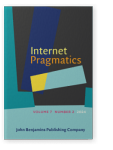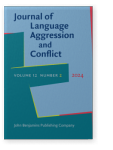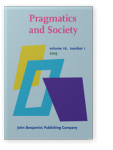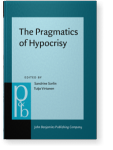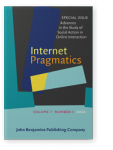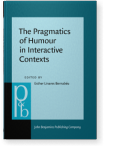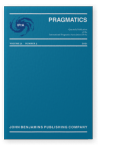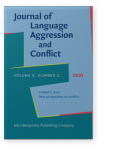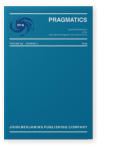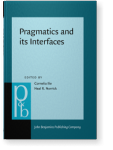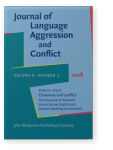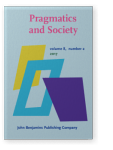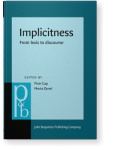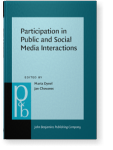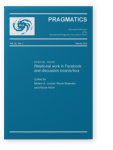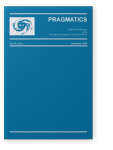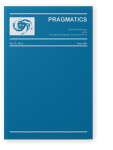Michael Haugh
List of John Benjamins publications for which Michael Haugh plays a role.
Journals
ISSN 2213-1272 | E-ISSN 2213-1280
2024 Chapter 7. Ostensible offers, politeness and sincere hypocrisy The Pragmatics of Hypocrisy, Sorlin, Sandrine and Tuija Virtanen (eds.), pp. 162–186 | Chapter
We know that sometimes when people make an offer they do not really expect us to take it up. It is generally assumed that these kinds of ostensible offers are a means of showing respect or consideration towards the feelings of others, without creating the trouble or imposition that actually… read more
2024 Online public denunciation as recursive social practice Advances in the Study of Social Action in Online Interaction, Sinkeviciute, Valeria (ed.), pp. 161–191 | Article
Incidents of online public shaming commonly start when a record of conduct that is perceived as transgressive by either one of the parties to that interaction or a third party observer is posted, in the form of a narrative description, photograph, audio/video-recording, screenshot, and so on to… read more
2023 Epistemics and conversational humour in intercultural first conversations The Pragmatics of Humour in Interactive Contexts, Linares Bernabéu, Esther (ed.), pp. 110–132 | Chapter
In this paper, we examine conversational humour in intercultural initial interactions, in which participants not only do not know each other, but also come from different cultural backgrounds, through the lens of epistemics. Our analysis examines episodes of conversational humour identified in… read more
2021 Taking it too far: The role of ideological discourses in contesting the limits of teasing and offence Pragmatics 31:3, pp. 382–405 | Article
While teasing can cause offence, participants on television variety or game shows are generally expected to tolerate it. In this paper, we examine comments posted on YouTube in response to reports of a leaked recording of a television host in Taiwan swearing at and insulting a guest who teased… read more
2021 The metalinguistics of offence in (British) English: A corpus-based metapragmatic approach New perspectives on conflict, pp. 185–214 | Article
Offence is a central concept in impoliteness, aggression and conflict research, yet has received only passing mention in definitions of impoliteness and related concepts. Janicki (2017) argues that impoliteness and language aggression scholars are needlessly worried about definitions. We use… read more
2019 Modulating troubles affiliating in initial interactions: The role of remedial accounts Pragmatics 29:3, pp. 384–409 | Article
Much of the research on affiliation to date has focused on how people do (dis)affiliation. This paper explores the remedial work that follows instances of disaffiliation between interactants who are getting acquainted. Building on an interactional pragmatics analytical approach informed by… read more
2018 Integrative pragmatics and (im)politeness theory Pragmatics and its Interfaces, Ilie, Cornelia and Neal R. Norrick (eds.), pp. 213–239 | Chapter
In this chapter, we first discuss the role that pragmatics has played in the development of (im)politeness theory, and the recent move towards a middle ground that integrates classic and discursive approaches to (im)politeness. We outline the key tenets of integrative pragmatics that afford such… read more
2018 Accusations and interpersonal conflict in televised multi-party interactions amongst speakers of (Argentinian and Peninsular) Spanish Closeness and conflict: The discourse of domestic discord across English and Spanish-speaking communities, Boxer, Diana and María Elena Placencia (eds.), pp. 248–270 | Article
While there is a growing body of research on impoliteness and conflict talk, the role of accusations in interpersonal conflict has been only addressed in passing. In this paper, we focus on accusations in conflict talk amongst interactants who are in a situation demanding the formation of… read more
2017 Prompting offers of assistance in interaction Pragmatics and Society 8:2, pp. 183–207 | Article
One of the ways in which we can get someone to do something for us is through hinting. However, studies that have attempted to systematically examine requestive hints have faced difficulties in identifying hints as they are designed, by definition, to be ambiguous with respect to the intentions… read more
2017 Chapter 13. Implicature and the inferential substrate Implicitness: From lexis to discourse, Cap, Piotr and Marta Dynel (eds.), pp. 281–304 | Chapter
Implicatures are generally conceptualised as additional thoughts, beliefs, intentions and desires that are intended by the speaker to be recognised by the hearer as intended by the speaker. However, implicatures are not simply cognitive constructs, but in being accomplished by persons in… read more
2015 Troubles talk, (dis)affiliation and the participation order in Taiwanese-Chinese online discussion boards Participation in Public and Social Media Interactions, Dynel, Marta and Jan Chovanec (eds.), pp. 99–133 | Article
Online discussion boards are a common forum in which everyday users share
troubles, elicit various forms of empathy and sympathy, and also seek advice
from others. One challenge facing participants, as well as analysts, is the interpretation
of expressions of discontent or dissatisfaction as either… read more
2015 “Doing deference”: Identities and relational practices in Chinese online discussion boards Relational work in Facebook and discussion boards/fora, Locher, Miriam A., Brook Bolander and Nicole Höhn (eds.), pp. 73–98 | Article
In this paper we examine a key relational practice found in interactions in online discussion boards in Mainland China and Taiwan: ‘doing deference’. In drawing attention to a relational practice that has received attention in quite different research traditions, namely, linguistic pragmatics and… read more
2008 Utterance-final conjunctive particles and implicature in Japanese conversation Pragmatics 18:3, pp. 425–451 | Article
According to the received view, connective particles are characterised as “bound grammatical markers” that connect two clauses into a ‘sentence’ (Matsumoto, Yo 1988: 345). As Fukushima (2005) points out though, these conjunctions have other functions that go beyond intra-sentential usage.… read more
2002 The intuitive basis of implicature: Relevance theoretic implicitness versus Gricean implying Pragmatics 12:2, pp. 117–134 | Article
The notion of implicature was first introduced by Grice (1967, 1989), who defined it essentially as what is communicated less what is said. This definition contributed in part to the proliferation of a large number of different species of implicature by neo-Griceans. Relevance theorists have… read more
